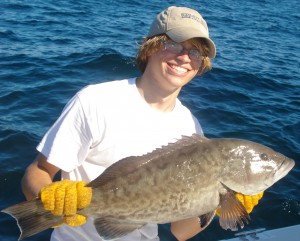
My son, Leo, and the grouper he caught, photographed by Joe Denton on September 4, 2010.
I love to fish and love to eat the fish I catch. But I and others have been involved in some correspondence taking place between Captain Chris Bryant of Bayou La Batre and Jim McCallum, a policy analyst with the National Fisheries Service. A key fact coming out of these communications is that the seafood in the gulf oil disaster region is NOT BEING TESTED FOR DISPERSANTS. Not only that, we don’t even have a seafood test for dispersants yet. The government, however, is working on such tests and expects them to be available soon. Meanwhile we’ve been assured that the seafood is safe and hopefully it is. But this is like instructing your children that it’s safe to look only one way before crossing the street. We’re testing for oil in the seafood, how reliable those tests are is another story, but we’re not looking the other way for dispersants. How safe is that?
This week we’ll be having our Future of the Gulf – Community Brainstorm. It’s Thursday evening, September 30, 7:00 P.M. at the Coastal Response Center – 7385 Highway 188 in Coden, Alabama. Our purpose, in light of the ongoing oil disaster, is to share community needs, resources, ideas, and opportunities with other people who care. As everyday people, we will brainstorm and encourage one another to act and move positively together to restore our way of life, health, and coastal fishing communities. Please share the word and come.
Umpteen Horizons provides gulf oil disaster news under the Empower News tab above. On that webpage, oil news can be found under Crises. Please continue to check Empower News as it will continue to improve.

